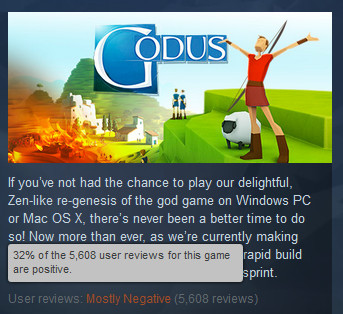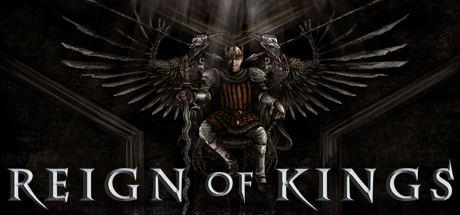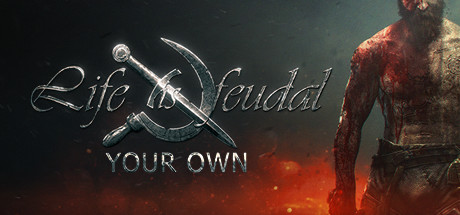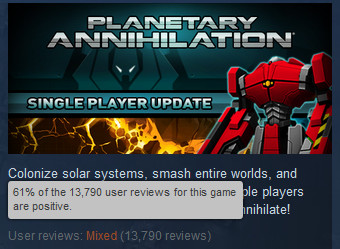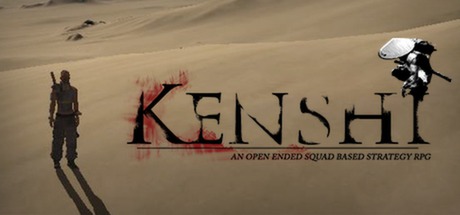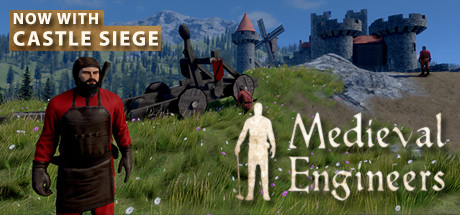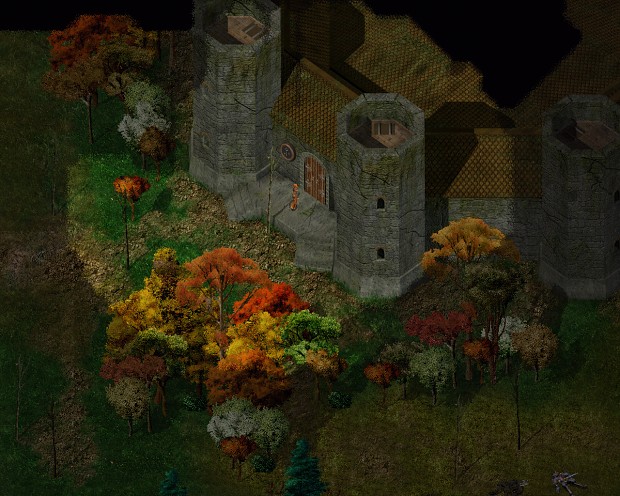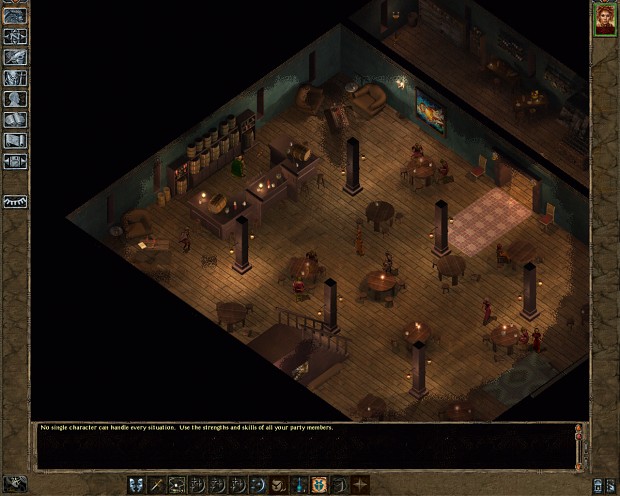feillyne
joined
« L'homme c'est rien — l'oeuvre c'est tout. » Je suis né et je vis à Babylone, là où les enfants tuent, dealent et volent...
In other words, some of the pitfalls of game development. As an addendum to the previous blog post: Moddb.com
***
Underestimating quantity
Quantity builds up quality. What is the difference between a quality mesh and a poorly made, blocky mesh? (Unintentionally low quality, not purposely lowpoly art, naturally!) The number of polygons. Yes, the number itself, not just the way the mesh is made. What is the real difference between a replayable game and a game that you can finish just once or that game you don't even want to finish just once? The number of possibilities, storyline or gameplay branches, numbers of enemies, levels, secrets, achievements... and more. (More, as in other things contribute to that irreplayability. Bad controls for example. Who can play a game with nasty controls for more than a few minutes? Only masochists or extreme e-sport fans, mayhap?)
So. Why play an unreplayable game?
Quantity makes up quality. Quite a chunk of indie developers choose to completely ignore that fact, and use that "quality over quantity" clichéd mantra as an excuse to avoid going an extra mile to give their own playerbase more content. The capitalistic "less is more" motto is extremely hostile to your players, and they can feel it when their money does not exactly equal purchased value. Aye, "less is more" is a good thing when you think about bugs and needless feature creep, YET it is truly something terrible when you consider cutting the number of levels, enemies, factions, perks, bosses, useful features, and so on. "Less is less" then, not "less is more". Gamerskind, pretty much like a Zerg hive mind, can feel someone is messing with them by giving them less content than planned or promised.
Too long indie GDDs never served anyone too well. Immensely important to know your limits, yes... immensely important to go an extra mile, however, too...
***
Giving up only after one failure and treating game development more like a hobby, not a real job
Game development is a job, you are supposed to continue developing games, not naively believe that your first game will be a huge hit. Stopping at just one single game is, well, preposterous. Continuing to make them, that should be the real purpose. Gamers hate developers who are only into it for money instead of being in it for both funds and passion. Real passion does not burn out after one failed game. Also to note, relying only on motivation may end badly. Game development, just like any other artistic activity, is like a fight, there is no good or bad mood for it, you have to push and continue it even when you dislike it.
Never give up if you really want to be a game developer.
***
Completely and totally ignoring the community's opinion while pretending to listen to feedback
Developers just like artists of any kind have the ultimate right to not give a damn about any players' opinions just like painters are free to ignore any suggestions made by their gallery viewers, freedom of creativity and all that jazz after all, but some issues may prove downright dangerous to ignore. Difficulty is one of them. Leaving critical bugs, scratch that off, no, many devs care about critical bugs, leaving less essential yet still annoying bugs as they are tends to be dangerous as well, just in the long run not the short run. Gamers can remember or recall better a company with bad reputation than the one with good one. Aaaaand to quote a certain artist, "Trifles make perfection, and perfection is no trifle". (Even when total pedantic perfectionism seems to be a bad idea too!)
***
Dishonest or only half-honest alpha and beta testers
Horrifying lack of objective, third party testers that can give you an honest opinion about your game. Just a couple of indie devs (and many more than a bunch of modders) feel insulted when someone constructively criticises their work, never realising that sometimes criticism is a blessing, especially when taken professionally, not personally. The above freedom of artistic expression blah blah still remains valid though, as an artist, nobody can compel you to do or make anything, it is simply safer to avoid implementing sucky things, you see, and criticism is supposed to weed out those sucky things... you see... criticism should always be valued. (Not just valued. Valued as in listened to.)
***
Letting your team members slack off
Projects either stagnate and die if left undeveloped for too long, or they are of less quality when shelved out for players. Unforgiving passage of time and the recidivist advent of new technology relentlessly beats crap out of those who dare to lag behind, too. Either way, if you let your team members do nothing for the project and you do not set an example by doing something of note (leader's example) or with your wallet (employer's example), then sorry, lions led by a sheep will get nowhere, and if your team members just laze around and only attend dev meetings, you can say goodbye to your dream game.
***
Treating alphafund/early access games as "released" games and thus requiring less attention
This is what plagued most alpha-funded games available on Steam's (ok, Valve's) Early Access. They were nuked by the community because developers suddenly found out how public pressure bores intolerably into them, barring them from further progress. So they just stick a "mission accomplished" and "not early access anymore" status on the game, when it did not even go through the beta phase properly. Remedy? If you care about reviews, you would have to take down your store page, and relaunch it when you are ready to roll out new updates polishing whatever needs polishing and fixing whatever needs fixing. Another way, while keeping the store page up, is to tie yourself to the chair, lock the door, severe the connection to the internet... no, not in that order... just to do one thing: to bear with external "fan" pressure that you (successfully) blocked out in the end i.e. started developing desperately needed updates for your game instead of hiding under the table away from the overly loud thunder of community.
***
Do you enjoy playing your own game? Do you REALLY enjoy playing your own game?
Take a step back. How does your game look? How does it play? Turn off cameras to stop recording gameplay, and play it purely for your enjoyment, just for a long while, not for youtubers, just for yourself. Did you truly enjoy the game? Most relatively bad games are born that way because that kind of developers fly through the game and play it solely as its developers and never or rarely care to play it as a bit more demanding gamers. How many hours can you play your game before you had enough?...
... you can expect most of your players to play at least around 1/8, 1/4 of that amount, depending on the game content, replayability and dynamic or key mechanics of your game.
Some devs seem to confuse simple promotion with marketing, and although many marketing practices directly or indirectly involve promotion of one or other sort, marketing is a different beast altogether. Below a short, oh wait, long guide how to do both! You can use or disregard any of the points made below, after all, nobody should tell you how to make or promote a game, you need to find your own path, these below are only guidelines if you need any.
How to market your game
Marketing is all about finding or carving out a market for your game.
1. Define your audience.
2. Define your market.
3. Less innovation or more innovation?
4. Development is an integral part of marketing when you assign different levels of urgency (priorities) to different activities.
5. Quality attest your game and fix it as you go.
1. Hardcore gamers? Casual gamers? Teenagers? Adults? Who is your target audience?
A. Casual or hardcore gamers? Then subgroups, gamers who simply want to enjoy the game or gamers who love extreme challenges (like in Super Meat Boy, Faster Than Light)?
B. Visual group. People who are into comic, or serious and realistic, or dark, industrial graphics? Oldschool graphics, such as pixel art, sprites (including old 2.5D isometric techniques), or new graphics, lowpoly or highpoly 3D art? (Sometimes your target audience may conflict with your target visual group.)
C. Age group.
D. Genre group, if you are mixing genres heavily, set priorities first, for example if your game is 85% FPS and 15% RTS then your genre group would be FPS gamers not RTS/strategy gamers (the latter would be secondary only).
2. What market are you targeting?
A. Location; the globe, anglosphere, or specific regions and countries?
B. Languages; recommended are English, Spanish, German, French, Portuguese (Brazilian), Russian, Arabic, plus some others such as Chinese, Japanese and extra languages (some translations can prove to be quite cheap, for example translations to most Eastern European languages), you should never rely on English only, it may be not enough. Two languages (your native one and English) may not be good enough either. Many indie devs skip this step and are satisfied with just one or two languages while at the same time they wonder why the game is not selling much. (Losing a few gaming markets because of no proper localisation.) You can also consider supporting fan-made translations if you are really short on funds.
C. Platforms (desktop, console, mobile, web platforms).
3. Less innovation as a more traditional approach or more innovation as a good selling point? It is your choice. The only thing worth remembering here is you can stick to one traditional genre or one grand game design while innovating specific game mechanics and subsystems. (Macro-tradition, micro-innovation.) Your exact game design will definitely influence marketing and promotion. Going for a completely new genre or a brand new game design is running with pioneer's spirit yet it is substantially riskier.
4. Do you want to develop new fresh content for x-packs to hook and captivate new fans? Or iron out those nasty, minor yet quite disturbing bugs just for your current playerbase? Any plans for those ever-hated DLC packs to spruce up the game and give it a little more flavour (after all, not all DLCs suck)? Perhaps you need spare time for making a website to promote the game? Marketing disconnected from development is as dangerous as development isolated from marketing. Also, in the AAA game industry, sadly, it is a quite common mistake to separate from and blind marketing guys to the wishes, hopes and demands of fans. (Development, marketing and fanbase should be at least loosely interconnected.)
Also, you may need to jot down your development progress, how many hours you spent, and where you need focus, especially if you feel you are wasting time or getting too distracted. Promoting and marketing as activities can also eat up a whole lot of your time so better to plan how much time you can spend on each dev-related activity, including primary and additional marketing or advertising.
Marketing (unlike promoting/advertising) starts with the beginning of your development. Focused development translates to better quality game and thus game more marketable and promotable.
5. Your game as a project may be finished, but that does not mean it is finished as a product. Fixing it after it has been released or adding small yet meaningful things that solve user issues can also serve as a marketing trick (as it proves you consider your game a product being refined as the time goes, not a mere project to be finished and discarded and all forgotten about).
How to promote and advertise your game
(ordered starting from the most efficient and contributing one)
1. Quality, quality, and quality of your game, plus the fun factor
2. Catch attention of editorial sites, reviewers, youtubers, letsplayers
3. Multiplayer, mapping and modding support
4. Additional community building on YouTube, Twitch, Facebook, Twitter, Reddit, IndieDB, and dev or engine sites
1. Publishing an unfinished, unappealing game translates to burning your chance to reach out. This is not about art style or development stage of your game, it is about gameplay, visuals and sound, the very skin, meat, bones, music, heart and soul of the game:
A. Boring gameplay, forced, predefined options. You definitely need to let the player choose. Video games are not TV, gamer's choice should not be limited to only changing the channel. Customisation is more than welcome.
B. Inconsistent or ugly style, visually unappealing game; lowpoly, pixel art and many other art styles shine when wielded well, but should they be half-baked or underdeveloped or undervaried, they can prove to be your game's downfall. The importance of visuals should never be underestimated, visual appearances catch your fans at the very first sight, keep them for a while, one moment enough to persuade them to explore your game a little more, while enjoyment and depth of gameplay that come later on captivate and devour them.
C. No variation, for example no terrain variation, character variation; you need as much variation as possible, never stop at just one type of bridge or even 1-digit amount of bridges, go for a 2-digit or 3-digit number (10+, 100+ tile variations, 10+, 100+ portraits to choose from, and so on).
D. Way too much innovation, or avoiding to break cliches or bad standards; this sometimes breaks marketing and makes it hard to find a specific audience for your game yet makes your game unique (or "more" unique). Eventually it will be up to you to go for more innovation (creating your own market) or less innovation (using one of the current gamer markets to reach gamers that prefer to play classic, track-beaten genres).
Controls for one, should never be "innovated" "too much", i.e. replacing WSAD/ZQSD with HBVN for no reason (some innovation, such as using IKJL keys may be actually reasonable depending on what exactly you are devving).
2. Catching attention of editors, reviewers, youtubers (letsplayers) is definitely the best way possible to make your game well-known as long as it is of high quality and/or enjoyable, enough to stand out. Pulling big editors' attention is quite hard, unlike youtubers. In both cases you need some review copies ready and sent out to the right people.
3. When your fans are bored with the singleplayer mode, multiplayer adds an extra dimension to your game. It is hard to implement and maintain yes, still, it gives you the right to e.g. enable a multiple copies purchase option on Steam for a valid reason (multiplayer games are perfect gifts!). Even simple local/couch multiplayer, LAN or connect by IP mode without servers of your own may help your game along towards the slightly bigger multiplaying audience.
Modding support is mainly for prolonged longevity, and to build a core fanbase which keeps returning thanks to the fan-made content. Sometimes people buy games they otherwise would not buy if it was not for the mods that have been made for them.
Not to mention the fact that modding and multiplayer support is basically self-building community (the community indirectly and directly promoting the game for you, and not just by word of mouth, but with custom content and gifts to their friends they want to play with).
4. This is "manual" community building (unlike "automatic" community building via modding/multiplayer support). Usually less effective than reviewers/youtubers/modders/multi-players promoting your game for you.
A. Short posts and notes on Twitter and Facebook, posts about events you are about to participate in, links to your website about any new content such as new GIFs, articles, new staff members, and any sort of happenings.
B. Starting up separate profiles on various networks and in various videogame databases, for example Made with Unity, IndieDB game profile, also posting new threads about your game on various forums.
C. Dev video diaries on YouTube, dev walkthroughs on Twitch and videos uploaded to other video services (even if those other video sites are not that popular, it is better to never ignore them as it may be good to upload your videos there just for those naughty SEO purposes).
D. Big media-rich posts on your blog, Tumblr, IndieDB or your own official website.
You can build your connections and become a regular at various dev forums and sites. To seem less pushy, you need to participate in the dev communities, it is all about give and take, not simply take. Many forms of advertising may come off as spamming if you registered only to advertise your game and not take your time to build your profile on many different dev sites.
Extra. More ways to promote your game:
Oh, for example adding a note somewhere that reads along the lines of "inspired by Elder Scrolls games" which is quite a shameless way to advertise and even SEO up your game using someone else's name or brand, best used only if you worked as AAA developer on those games and as long as you parted ways on good terms. Bad and underhanded ways such as raising controversy can be also used to catch the scrutinous eye of various sites, although this method is not recommended at all.
By the way, mistakes in particular that influence promotion of your game and can destroy your game in reviews, the kind of mistakes to absolutely avoid:
1. Game-breaking bugs, game-breaking mechanics (e.g. in-game gambling that players can easily abuse)
2. Difficult controls, or e.g. controls-neutral physics (levels, enemies should be difficult, not controls)
3. Incomprehensible, clunky or cumbersome GUI/HUD (it should be intuitive, the kind your players can learn without any tutorials or unnecessary juggling)
4. Zero manuals, tutorials or guides of any sort (unless you really have a strong reason for leaving players without any?)
5. Any outstanding quality issues (the above mentioned, no visual appeal, no visual variation, and so on)
Quicklist of essentials:
1. Ever improve your game (it may be partially or completely finished as a project but still not ready as a product!)
2. Send out review copies to editors, reviewers, youtubers/letsplayers
3. Support multiplayer mode and modding/mapping
4. Build the community (Twitter, Facebook, Reddit, YouTube, Twitch, Tumblr, IndieDB, engine/dev sites)
This is all! At least at the moment.
(This article is licensed under CC-BY, written by feillyne, it can be reposted and used for whatever purpose.)
Sometimes, alphafunding and crowdfunding just seems to be badly overrated these days. Why, you would ask. Personally, thinking of these major reasons:
1. Crowdfunding basically works like debt; you ask gamers to fund your game first, but you receive money in advance rather than invest your own funds in making a product and then getting paid for (profitting from) it after it is all finalised and released.
2. Alpha-funding is paying for partially finished games. Pros? You get at least some part of the game you paid for, so it cannot really turn full vaporware on you. Cons? Developers can take it in direction you do not want it taken, vide Godus that became a mobile game without any warning or consideration for PC gamers, or suddenly jump from the alpha version to the "final" version without any actual polishing done, for instance Reign of Kings or Life is Feudal.
3. Crowdfunding is also sometimes used to rip gamers off and milk them as much as possible. Never occurred? It did actually: the infamous work of digital interactive gaming art, Planetary Annihilation, is the "finest" example of this behaviour. The first editions of Planetary Annihilation were so overpriced that the ripped-off backers are still fuming about it.
4. Alpha-fund limbo; yes, games developed for so many years it becomes increasingly doubtful whether they will be fully released at all - or just wanna beat Duke Nukem in terms of secret or imaginary development time. Godus comes to mind again, in this regard, as the completion meter of Godus does not go forward anymore. On a side note, there is also Overgrowth, which is still actively developed, yet its development time is around 8 years which probably can make your head spin when it comes to think about it. As you can see, sometimes alpha-fund developers can take their sweet time completing their game, just because they are too insecure or too greedy to hire a few additional staff members to make it come along substantially faster.
It just feels like more and more developers hide behind the indie buzzword just to deliver shitty games and stop caring about bugs or final quality, never feeling responsible for their "indie" works or being aware that their games are actually products that are supposed to possess some decent quality, or use crowd/early access campaigns in an ultra scammy manner ending up with some good yet really badly marketed game.
Focusing on more than just negativity of alphafunding/crowdfunding, there still seem to be some great gems out there that are shining brightly, such as Space Engineers, Medieval Engineers, and Kenshi. Speaking of non-indies, e.g. Pillars of Eternity crowdfunding campaign also delivered what it promised and received great community reviews. So the point of crowdfunding/alphafunding games is not entirely lost... not yet at least.
Seems like the C&C series is dead indeed. Mostly because of the three C&C titles that have been totally botched up during the last painful spasm of the franchise.
1) Tiberium: suffered huge delays; the development team took the money but never delivered anything except a demo; its management team had to be at fault, some rumours were circulating talking about e.g. how artists were playing web games instead of working on new assets.
2) C&C4: well, everyone knows its story. C&C4 is hardly a C&C title - it is merely an RTT game set in the tiberium universe, with exceedingly awful DRM (thank you EA for punishing your legitimate customers /sarcasm); perhaps failed due to community management and bad polls conveyed = extremely bad communication between developers and the community.
3) Yes, excruciatingly disappointing Free To Play C&C which most likely would turn out to be yet another Pay To Win (or DLC bonanza) game anyway. This one could be (and was supposed to be) a proper retail-style Generals 2 with one nice polished x-pack, not FTP(P2W/DLC) pseudo-marketing trickster's crap.
So sadly, the old era of C&C came to a horrifying end. Whether there is hope for the series or not... it remains to be seen.
Well, there are still some hopes and rumours around Gospelherald.com (newer) Gamerant.com (old) Uk.ign.com (older) that it may be only dormant and the franchise can be revived sooner or later, but knowing EA (and how the EA team deals with titles that cannot be sufficiently milked and developers easily left disgraced), would not keep high hopes for that. Not soon at any rate...
* * *
PS By the way, not sure if WarCraft 4 or Age of Empires IV ever sees the light of day. One of the Microsoft's studios was rumoured to work on an RTS title (which turned out to be Halo Wars 2) so not expecting AoE IV anytime soon either. WarCraft 4... may be likely, but Blizzard was worryingly quiet about this one.
As people were casually asking, well, game dev* goes at a snail's speed (at a mad speed compared to the previous year thou), everything else is snafu or so-so as usual. Constantly getting sidetracked too.
Nothing left to say here. :-)
Didn't someone already said that actions speak louder than words?
And PS the previous blog post is just a load of judgmental crap so you have nothing to lose if you ignore it.
This blog post was inspired by What is the most beautiful game you've ever played? thread.
Gameplay vs graphics vs plot/story
Which of these is the most important part of a video game? Gameplay? Graphics? Plot, story?
Actually it's an evasive, inaccurate question: importance means nothing here since it's just a highly opiniated personal feeling, it's rather what you focus on in the short run, at a first glance, and what you focus on in the long run, after playing a specific game tens/hundreds of times - especially if you had many "returns", "breaks" and "disengagements".
So what do you focus on before buying, when playing a game? In the short, long run?
Focusing here on:
1) game graphics, or rather the feel of graphics, the style of graphics
2) story
3) and in the long run, many years after the last play... game plot/story again
Well, actually focusing on the game genre first - mainly plaing RTS/RPGs and action "RPGs"/"adventures" (GTA, Saints Row) so that's the real first ninja-thing on the list here.
1. Game graphics vs graphics style?
The question itself begs the question, does it?
Why divide it into game graphics and graphics style all of a sudden? Answers are simple, they begin with "Minecraft" and the "integral part of the game or the gameplay". As a developer noticed here in this thread, there is a huge difference between intentional "bad" graphics and unintentional bad graphics.
Intentional "bad" graphics:
- pixel art
- 2D (or pseudo-2D, some games such as old C&C games mainly use 2D sprites, 3D voxels and the 3D projection, so they are 2D-looking 3D games, 2.5D games)
- text-based
"bad" graphics" which are not "bad" at all, they can only look bad to some people - at least to as few as possible, hopefully. The classic example is Minecraft. The other example is all other pixel art games - where pixelart is not only spotlighted as the main exterior feature but also mastered to perfection.
Unintentional "bad" graphics caused by
- developer's intentional or unintentional omittance, such as a low res texture in place of a high res one
- hardware limits (especially true for many "ancient" 3D games)
- and many other factors, such as time/financial constraints of a developer, etc.
So yes, definitely the graphics style here. It's whether developers succeed at perfecting their style, no matter the style.
Yes yes unfortunately looking at the graphics first when buying a game. The superficial graphics, the fakes. The shallow, banal, repeatable, empty side of the game.
Wouldn't play pixelly-3D Warcraft III, eye-candy Age of Empires III, unhandlable GTA III or tradition-breaking (GUI in the "wrong" place, crawling 3D-only graphics) C&C Generals for their graphics or their graphics style. Gameplay (features, balance, learning curve, non-story missions/challenges, general playability etc) maybe, but definitely not graphics.
Baldur's Gate, needed only a highres/widescreen mod + GUI correction:
^- no need for any retexture mods at all, after so many years. Originally released back in 1998, that makes Baldur's Gate about 15 years old.
2. and 3. Story?
Yes, the story, the plot, the characters-relationships-and-shit-is-happening-and-someone-has-to-do-something.
That's what... tries, keeps, forces? to return to the game, even after many years. (Yes Baldur's Gates, Icewind Dales, Fallouts looking right at you!)
If a game doesn't have any story - that's bad, since then only gameplay counts, instead of a story. Game balance and gameplay flaws (game breakers, both major and minor tangible nonfeatures) destroy the experience pretty hard. Can't play something that has nothing redeemable (ie a storyline to walk "on" or through and finish) about it to buy it out of its fake-centered misery.
IMHO, neither graphics nor gameplay gives a degree of depth to a game. Not even an ounce. But they are things that make video games immensely interactive, make them different from e.g. books or films. Yes there exist game books - but they are - as the name suggests - game books. Only the plot, the story element is something shared between videogames, books and films.
And as the concept suggests, the story is what acting, voice acting, dialogues convey and it's much less about action, which in moderate quantities serve to intensify experience instead of covering or diminishing the story. To be sincere, it's not always true - some bloodthirsty combat-ridden classics such as Baldur's Gate, Icewind Dale have lots and lots of enemies and opponents to overcome or simply send away packing from the world (to another miserable life in another video game world most likely) still manage to keep players returning to the game because of the usually world-crashing ultrachallenging story. Maybe because gamers ignore all the blood, combat and only remember the story itself? (Which probably gets sucked in by the long term memory.)
Can never know.
Ah, the last thing. The hard-hitting-in-the-face fragment of stories.
It's the revelation of the centrepiece of the story - the person, the thing that started havoc, caused the first riots, began state-gripping and realm-ripping intrigues, and other things turning-the-world-upside-down. It seems pretty awful if it is clearly revealed in the prologue, or the first or the second chapter.
Was extremely enjoying Dragon Age Origins as far as gameplay goes - the thing is - it has all the shitty banalities (especially the "Horde" ouch!), and the plot is revealed right in the prologue and the first chapter. Defeat the evil dragon-demon blah blah and save the kingdom blah blah, slash through evilish hardish hordish mess of monsters blah blah, and all that tropefied... stuff. So in the end, enjoyed Dragon Age II more which was less centered on extreme banalities and the "standard" fantasy side. The Dragon Age II story also seemed to be much less banal than DaO's.
To compare, Baldur's Gate I:
1) what's going on is revealed in the Chapter 6 (unless you know D&D/Forgotten Realms history very well, you basically have no idea of what is going on)
2) the main boss/opponent is encountered at the end of prologue
3) the centre piece is a conspiracy, but not that banal world domination or world destruction plot - but the (spoilers) apotheosis of the godspawn Sarevok - which tried neither to dominate or destroy the world, but to murder his siblings through assassinations or regional wars, to subvert some realms/regions either unknowingly or knowingly to fund his campaign against other children of dead god of murder Bhaal, and ultimately, to become the Lord of Murder himself
So Baldur's Gate feeds players with small bits of the story, of what-is-happening, gradually. Something that suspends mystery and lets it float like a fog over everything you are through.
Something plot-related that seems to be incredible improbable to be featured in the "newer" games. The element of mystery.
Can't believe that developers such as those of Dragon Age Origins (BioWare, but mainly the idea-guy of that... thing) could feed gamers with that fast foodish banalised thousand-times-repeated shit that should have nothing to do with the fantasy genre.
Yes extremely enjoyed DaO - gameplaywise, yet thoroughly loathed the banal plot and the setting. Couldn't return to it even twice (played only once through), while already finished Dragon Age II like 3 times - because of less banal story/setting mumbojumbo.
Another instance of the truth that mainstream sells stereotyped crap because such crap sells.
Uh, this blog post mutated and became longer than planned. Let's finish.
So. Looking at fakes first (graphics, graphics style, game genre), then in the middle and in the end at the game depth (story, plot). Mainly a single player here, that's why. Multi players would probably focus more on the gameplay rather than the story. To note, "player-initiated", custom role playing e.g. in MMOs would be a completely new subject to cover, and maybe something plot/story related as well. Would that count as story/plot or as gameplay? You decide.
Two questions for you.
What do you focus on in the short, long run? Was there any games that you made an exception for, that you played for entirely different reasons than normally?
Licence:  This whole text is licensed under Creative Commons Zero (public domain): Creativecommons.org can be diffused, copied, distributed, edited, published anywhere without any credit given.
This whole text is licensed under Creative Commons Zero (public domain): Creativecommons.org can be diffused, copied, distributed, edited, published anywhere without any credit given.
Outline
So, what's your idea of a perfect government or a perfect sociopolitical system?
IMHO, a council-based government:
1) abolishment of all godheads/idols/single-concentrated forms of governments - a gov't of Councils rather than presidents/PMs/ministers/whatever, a group-based government, the top power to one specific group without a presidential spokesman or anything similar
2) purely resource-based
3) communication of needs through the Internet or similar technology
Everything for free, and work would be also for free. Any products of work would go to the community. Additional resources & rewards for quality work. (Right now this world is all profit-based: as cheaply as possible as quality as possible.) As high quality as possible and as safe as possible, with less consideration of amounts of resources used to achieve that. More prevention & responsibility-based system. Doing what's needed with high safety measures (instead of doing what's needed but as cheaply as possible resulting in drawbacks, flaws due to economical and time constraints).
Notes
1)
1. councils instead of presidents
2. minister groups instead of ministers
and so on.
Generally groups & boards deciding about everything. No central person at all or even any form of a leader of a committee/council.
2) & 3)
1. The council government distributes the natural wealth and resources. (In the current world "natural wealth" and products are distributed by companies/corporations/banks/etc and people among themselves while the gov't only regulates everything.)
2. This distribution of wealth to those who actually need it would be possible thanks to the Internet or any similar technology. (Communication of needs was heavily limited in tribal barter/resource-based governments.)
3. Only people actually interested in governing, gardening/agriculture, would do their jobs. That includes specialists, passionate hobbyists, etc.
4. In a society & culture where everything is free, there would be still many people interested in doing arts, gardening, hobbies, etc. So still everyone would do their kinds of "jobs". The only difference is that it all would be for free.
5. There would be no jobs such as digging rows at all unless there would be extremely advanced technology to make it lightning fast with very little effort. So less manual labour, everything would be more dependent on right technology to achieve better results with drastically less hard work.
Further points
1. No classes or political parties, only councils
2. Preferably no nations as countries at all, just nations as local/national councils
3. Entire society of geniuses (children from 4 years old up to 8 years old taught ethics and advanced science to have easier & better grasp on studies & science later on)
4. Peaceful technology open/open-source
Licence
 This whole text is licensed under Creative Commons Zero (public domain): Creativecommons.org
This whole text is licensed under Creative Commons Zero (public domain): Creativecommons.org
A continuation of the previous blog post titled a secret of Toltec shamans.
The entirety of post below is only a hypothesis/belief.
Belief about reality and deity belief of Tezcatlipoca
Toltec knowledge spoke about a different version of Tezcatlipoca. Commonly, Tezcatlipoca is an Aztec god. The belief that Tezcatlipoca is just a god seems to be just a very personalised and deified version of the whole story.
So was everything about the subject said? No, not all at all, it seems. So what's the real belief behind Tezcatlipoca?
Tezcatlipoca = person is mirrored by other people surrounding him = outer worlds reflect the inner world
Tezcatlipoca is a concept that we all are mirrors and reflections of each other. Your friends, relatives and everybody else you meet is said to be a mirror of yourself. Everybody of your associates and friends is supposed to have some of your features and characteristics, sometimes greatly magnified or standing out, and also, you have something nobody seems to have (and that is a mirror exclusively for your friends) but on the most part you are like other people around you.
The closer people seem to be, the more they seem to mirror each other.
So it works like:
like attract like, similar people attract similar people, and everybody you know is a mirror of yourself (a partial one, i.e. every person you're around mirrors something in you)
atheists attract atheistic people, altruist people attract altruistic people (not necessarily attract "pure" atheists or "pure" altruists just people who have some atheism or altruism in them or in their attitude)
Tezcatlipoca: however partial and partially it seems, people seem to be mirrors of each other and mirror each other, each other's features, characteristics, attitudes and goals and many other things.
For example an ignorant, quick-to-angry RPG gamer would naturally attract other RPG gamers, ignorant people, angry people. They would constantly stumble on each other. The surrounding world of his friends/associates as a whole would mirror his own attitude to life.
Summing up
All of above is just a belief that reality is so, that we are mirrors of each other. Whether it's true or false, it's only for you to decide.
A secret of Toltec shamans
It seems Toltec shamans either discovered or were given a long time ago a peculiar secret about "luminous beings", a secret about humans, animals and other beings of light (those composed of atoms/energy). So what's the secret?
It's simple: Everyone has a twin, a double that is dreamed by a person (called the dreamed). Moreover, this very double can dream about his own twin (himself) in his dream. (A dream within a dream.)
What does that mean? Well, it may mean that we (our bodies) are light that may reflect itself just like regular light.
So yes, this secret appears very simple... yet it's the awareness of the twin that counts, and the practice to make oneself aware of him, which is the other part (99%) of the whole secret.
The art of stalking
The one who received and mastered art of dreaming (being aware of the dreamed twin, and interacting through it) and art of stalking (watching one's routines, thoughts, feelings, addictions in order to trap them to either have control over them or to get rid of them) was called a Toltec. Anthropology seems to be very little aware of that meaning of the word "Toltec".
What is the art of stalking? It is an art of watching one's mental, personal surroundings: one's own feelings, thoughts, and also addictions.
Once a useless or negative routine, a thought, a feeling, or an addiction is trapped by one's own personal undivided attention, the problem can be easily dealt with and dropped.
If you examined closely your own addictions or notorious unpleasant thoughts (those recurring ones), you see that they have most power when they go without any notice by you. Once you set your utmost focus on them, they are trapped.
For example, person who drinks too much seems to be powerless as long as his attention avoids being focused on the problem. And yes, the same person could make thousands of excuses and create thousands of distractions to avoid facing the problem, even telling himself that he really *knows* about the problem! Knowing about it is nothing; it's the attention on it that counts! Also, person must be willing to do anything, first. Without the said person's decision and own free will the attention seems to remain useless and headless, like a ship without a captain. Dropping anything whether it seems "positive" or "negative" requires one's choice.
Toltecs would also stalk their own daily routines simply to get rid of them, and live a more mysterious, exciting life. :-)
